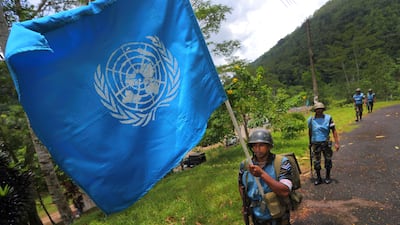I was in New York last month to release a report on the future of the United Nations, with ideas crowd-sourced from students, policy makers, business people and civil society. Many of the proposals originated here in the UAE, at the Emirates Diplomatic Academy and New York University Abu Dhabi.
The UN emerged from devastating conflict as the best idea for global citizenship that mankind had yet had. If the UN did not exist, we would need to invent it to help states work together in pursuit of global security, justice and opportunity.
But we now face a century of change like no other in history. Technology will transform how we meet our needs for peace, dignity and community. This will shatter the global political equilibrium. States, ideas and industries will go out of business. Inequality could grow.
Already, the internet has changed the world faster than any previous technology. The smartphone has given a super power to much of the world’s population. For many, the web is no longer for our downtime, but for all our time. From self-driving cars to artificial intelligence, as Nobel Prize winner Richard Smalley says, "when a scientist says something is possible, they're probably underestimating how long it will take. If they say it is impossible, they're probably wrong". And we're only just getting going. Whether from data, computer chip advancement, global temperatures or demography, the patterns shows us that change is accelerating at a staggering rate.
So, for the first time, technology offers the prospect of the world's population having an instant, global means of communicating, of consuming information and of forming opinions and communities. Digital technology empowers the individual to take greater control of their lives. This connectivity could unleash an unprecedented force for global development. But it could also leave us feeling overwhelmed, unable to keep up, unequal, exploited by corporate algorithms and reduced to variables to be mined as big data.
How humans manage this paradigm shift is the greatest challenge of our time. Yet when we have the tools to react globally, we are failing to use them. We have not begun to truly adapt our global institutions to the new realities.
If we are in the foothills of a truly global, connected, civilisation, where but the UN can debates be led to protect our basic human needs in the Networked Age? But diplomacy is hard in periods of economic and political uncertainty. What the UN represents – a system based on states, hierarchies and the status quo – is becoming weaker. The pace of technological change means that the internet has often been something that happens to the global architecture, not a force marshaled for our collective objectives. As former US secretary of state Madeline Albright puts it, “Citizens are talking to their governments using 21st century technology. Many governments are listening using 20th century institutions. And delivering 19th century responses.”
____________________
More on the United Nations
Beyond the Headlines Podcast: Peace efforts, economic leverage and spoilers
Reform takes centre stage at the UN as it faces up to its failings
The world cannot afford not to have a UN
____________________
So the UN must innovate with urgency, or face a slow slide into under-resourced decline and irrelevance. Our report included proposals for a UN innovation panel, ramped-up social media engagement with the public and online hearings for all senior UN jobs. But it also looked at the debates needed on the implications of artificial intelligence and big data, recommending that we need new Geneva conventions and a "declaration of internet rights" to protect us as individuals from the threats created by the internet. We looked at how technology can get the right education to a generation of young people on the move, and find new ways to support the world's most vulnerable people.
The generation now coming to positions of influence is the first to have spent their entire career networked and online. The UN must adapt its methods to their Networked Age without compromising its values. It must use technology to increase effectiveness, build public trust, mobilise opinion and action, and instrumentalise compassion. From refugees and beneficiaries of UN help, to policy makers and curious global citizens, the UN has a more powerful constituency than it realises. We need the UN and the UN needs us.
____________________
More on the United Nations in Opinion
The UAE's message to the world leaves no room for ambiguity
The UAE is at the forefront of the effort to revitalise the United Nations
Extremism crisis needs alliances
____________________
If it does this, I believe that the UN in 2020 can take advantage of the huge opportunities of the Networked Age in order to counter its growing threats. We need to marshal the best instincts of humanity against the worst. We hope that our report, made in the UAE, can be part of the UN’s fight back.
The great dividing line of the 21st century is between two basic human instincts – to fight for resource, or to negotiate for it. We need the UN more than ever because the implications of diplomatic failure are more catastrophic than ever. Pre-internet in the 1950s, the then UN secretary-general, Dag Hammarskjold, understood this when he said, "we are not permitted to choose the frame of our destiny. But what we put into it is ours." It is time to choose what we put into that frame.
Tom Fletcher is a former UK ambassador and adviser to three prime ministers. He is an adviser at the Emirates Diplomatic Academy, visiting professor at New York University Abu Dhabi and the author of The Naked Diplomat: Power and Politics in the Digital Age


